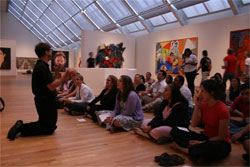Summer Principals Leadership Academy Learns It Takes Two To Tango -- Leaders And Followers
When Megan Earls returned this fall from TC’s
Learning Spanish is important, but Earl believes it is also critical to give teachers a chance to sit in their students’ seats for a bit—especially the seats of students learning a new language. “It’s really important to experience being a struggler and to reflect on that.”
Skillful communication and empathy were key themes at this summer’s
During a six-week summer session that ended August 1st, 136 participants were intensely involved in rigorous academic preparation,but also produced paper sculptures and got a lesson in playing the banjo. They then responded to master artwork and performance-level music with new eyes and ears, having dived in to the artistic experience themselves. “Some people were out of their comfort zone,” Drescher said. “But, frankly, it’s okay to make people uncomfortable. A smooth sea never made a good sailor.”
When Earls and other current participants, faculty and alumni of the program return to
Now taking applications for its fifth summer cohort in 2009, the Summer Principals Academy is a rigorous, 14-month, 36-credit master’s degree program given over two, six-week summer sessions. During the school year between the two summers, participants complete a 450-hour administrative internship at the school where they are employed. At the end of their second summer session, they earn a master’s of arts degree or a master’s of education degree in Education Leadership Graduates also meet the requirements for a
The program, which began in 2005, is designed for teachers with at least three years of classroom experience, who wish to become public school leaders. The cohort of first-summer students nearly doubled in size this year, to 88 from 48, bringing the total number of participants this past summer to 136. Drescher expects the 2009 session to accommodate about 180. About one-third of this year’s participants teach in
Participants work in teams and take courses on how students learn best, what curriculum responds to how students learn, and how to know that it's working. The program focuses heavily on self-awareness training, emotional and cultural competencies, adult professional development, , conflict resolution and negotiation adapted specifically for school leaders, and participants receive training in real-world skills such as how to involve a community in school concerns and how to manage a budget. The culminating group project, at the end of the second summer, is to design a new school, using the New York City Request For Proposals process, and to present plans for the new school in front of large audience and an invited panel of educational experts from around the country.
“Having run schools for 25 years myself, I am very impressed,” Drescher said of this year’s cohort. “They all share a passion and commitment and desire to become education leaders who will definitely make a change.”
Published Monday, Oct. 27, 2008
